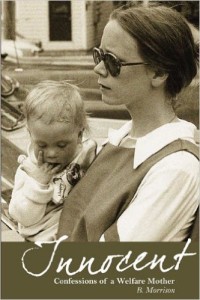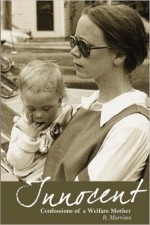INNOCENT—AND ON WELFARE
 Hillary Clinton wrote to thank Barbara Morrison for writing Innocent: Confessions of a Welfare Mother. The letter said: “I am grateful to you for sharing your personal story and demonstrating the positive impact that social assistance programs make upon families, communities, and our country. Yours is a vital story to tell.” I found Innocent a compelling page-turner as well.
Hillary Clinton wrote to thank Barbara Morrison for writing Innocent: Confessions of a Welfare Mother. The letter said: “I am grateful to you for sharing your personal story and demonstrating the positive impact that social assistance programs make upon families, communities, and our country. Yours is a vital story to tell.” I found Innocent a compelling page-turner as well.
Last week I had a chance to talk to Barbara, who grew up in the lovely Roland Park neighborhood of Baltimore, about the personal traits she brought to her unexpected years as a welfare mother.
SL: On the first page of Innocent, you describe watching tv half hidden under the sofa. You were four and you pulled yourself entirely under the sofa when your mother came to the doorway. It brought to mind a hermit crab, aware of a need for independence and self-preservation. Is that a fair interpretation?
BM: Yes, that’s true. That’s my earliest memory. There’s the family you’re born into and the one you create for yourself. It seemed important to set the tone for the book by telling something about where I came from.
SL: Along those lines, I want to know more about the you, the narrator. What happened when you went to first grade? What were you like then?
BM: It’s the nature/nurture debate. I was a shy person. I kept to myself, but I had a couple of friends, people I still know.
SL: How are you still like that first grader?
BM: I’m still an introvert though I learned to act like an extrovert in college. I figured that out, that I had to be more outward to succeed. I can do that, but I still need my alone time.
SL: Early in the book, you say about the man you married that you knew a man with braids who lived in a school bus wouldn’t be a traditional husband, but I wonder what expectations you did have?
BM: This was the sixties and early seventies. I was young. I wasn’t looking ahead that far. I didn’t expect it would last forever. I thought he’d be a good husband and father. He had custody of his three-year-old son. He could do almost anything.
SL: This was in the early years of feminism when women were trying to figure out how to get some freedom in their relationships with men. I guess men were trying to figure out how to hold onto their accustomed freedoms.
BM: They were confused and didn’t know how to respond to the changes women were making.
SL: Your two boys must have grown up in a world of women.
BM: They had a lot of women in their lives, but they also found men who were role models. It was good for me to have boys—I was having fun with my boys.
SL: Innocent is at one level the story of how you learned to stand your ground. An example that stands out is the time you insisted on emergency care for your friend Sherry’s little girl.
BM: I heard so many people say: You can’t do that. I had to learn to be loud and strident in order to get the most basic welfare. I kept a journal and occasionally quote from it in the book. At first, I thought I could just publish the journal, but there wasn’t enough context. It turned out to be more of a research tool.
SL: You also had to fight to get a crib for your second baby though you had a voucher for it.
BM: People saw welfare mothers as a football to be kicked around.
SL: It was shocking to read the way people assumed they had the right to pass judgement and make decisions for welfare mothers. It was enough to make me cringe. You survived that as well as the demands of substandard housing, inflated bills, limited groceries and no money for clothing.
BM: Something of the Puritan mindset remains in our culture. People assumed I was morally and intellectually challenged. Some of them thought I didn’t know what I was saying. But the book isn’t angry or bitter. When you write a memoir you have to think about why the other people acted as they did. It was good for me to do that.
SL: You describe being part of a Morris Dancing group with people who weren’t on welfare, and having friends who scratched their way out of poverty as two things that helped you through those years. Is there anything else you could mention?
BM: Having friends in that world of welfare was the most important thing. It was impossible to make enough money to pay for childcare, though a few of us found a situation where we could work. [Trading childcare was one way.] The main thing that helped me get off welfare was my kids got old enough to go to school. You have to make a lot of money to pay someone else a fair wage to tend your kids. The schools don’t like to be thought of as babysitters, but it’s really true that the biggest help was to have someplace the kids could go every day.
SL: All the way through the book you come across as a shy woman who had to get out of her comfort zone to survive. We’ve both been members of Maryland Writers Association for a long time, so I’ve been aware of you. My impression is that you are a shy woman, and yet you are in the forefront of organizing and promoting events for writers. You go out and make things happen for others.
BM: It’s true. My mission is to create community. Reading is one way we do this. When we read we learn to empathize with others. Reading this book you learn that welfare people helped each other. Even when I worked as an engineer [after teaching by day and earning another degree at night] I thought that people should help each other at work—wherever they happen to be.
SL: Is there anything else you want to point out to our readers?
BM: People often ask who the antagonist of the book is. It’s society—but also it’s my mother. To her credit, she stayed with the relationship. I didn’t think she would after she refused to help me while I was raising two children on my own. With both my parents, we found a way to be together when I went to help them after my dad got ill. Also having kids helped me to see what my mother had to deal with, especially when I had three extra children near the end of that time.
SL: What keeps you busy now?
BM: I’m retired from my work as a network engineer and, later, a cyber security engineer. I do lots of readings, and work shops, and interviews. The response is overwhelmingly positive. One interview was picked up by forbes.com and then by MSNBC. That brought the most remarks, but only a few people said mean things, like “you and your children should have starved instead of taking money from the government.”
I’m still interested in the way people on welfare are treated. In the 70s it was bad but it’s worse now, ever since Bill Clinton’s 1996 Welfare Reform Act. The act was meant to give the States more say in how welfare money is used. It can be used for any poverty program. The unfortunate effect is that the people who most need direct help get less and less.
SL: Are there things you still deny yourself from the habits of the welfare days, or do you emphasize food and/or clothing in compensation? Or…?
BM: Hmm, I don’t think of it as denying myself. But even once I started working I had very little discretionary income, what with raising the boys and putting them through college(and I was working 2-3 jobs). By the time they’d finished college and moved out it was way too late for me to be interested in acquiring a lot of stuff. I’ve been more interested in downsizing. My diet is still primarily rice and beans and oatmeal, though I’m happy to be able to buy more fresh vegetables. My one “treat” is that I’ve been paying someone else to fix the car since I started working, though I still love that I know what’s wrong before I take it in.
Barbara Morrison, who writes under the name B. Morrison, is a poet and writer, a publisher, freelance editor, teacher, and dancer. In her new poetry collection, Terrarium, she explores the influence of place: where you live, where you grew up, where you travel, where you go in dreams. Her previous collection, Here at Least, chronicles a journey undertaken in response to Rilke’s directive: “You must change your life.” Her memoir, Innocent: Confessions of a Welfare Mother, is a powerful coming-of-age story that dispels some of the myths and misunderstandings about those living in poverty.
Barbara’s award-winning work has been published in anthologies and magazines. She conducts writing workshops and speaks on women’s and poverty-related issues. She is also the owner of a small press and speaks about publishing and marketing. She reviews books on her #MondayMorningBooks blog and tweets regularly about poetry @bmorrison9 using #poetswords.
Barbara conducts one-day workshops and multi-session courses in poetry, memoir writing, book marketing for authors, building a solid story structure, giving a successful reading. For information and events, visit her website and blog at bmorrison.com.
Sonia Linebaugh
Sonia L. Linebaugh is a freelance writer and artist. Her book At the Feet of Mother Meera: The Lessons of Silence goes straight to the heart of the Westerner’s dilemma: How can we live fully as both spiritual and material beings? Sonia has written three novels and numerous short stories. She’s a past president of Maryland Writers Association, and past editor of MWA’s Pen in Hand. Her recent artist’s book is “Where Did I Think I Was Going?,” a metaphorical journey in evocative images and text.
